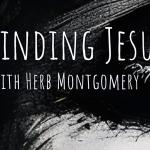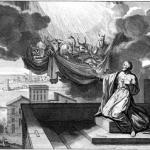Adventurous Lectionary – November 26, 2107 – The Reign of Christ
Ezekiel 34:11-16, 20-24
Psalm 100
Ephesians 1:15-23
Matthew 25:31-46
We often use words descriptive of royalty to speak of God – “Lord,” “Sovereign,” “Ruler,” “King.” These words describe divine power and sovereignty, and power is important when we speak of divinity. Although we may want to ditch hierarchical language, it is important – and quite salutary – to remember that God is God, the wise and providential creature of all things, and our ultimate concern. Our lives our brief and our concerns finite in relationship to the One who brings forth galaxies, stars, and the multi-billion year evolutionary journey of this universe. We need to be filled with awe at the nature of God’s power, and proclaim “how great thou art!” But, as theologian Thomas Oord, we need also to affirm God in terms of the “uncontrolling power of love.”
Power is ambiguous, and when we speak of the Living God, our images of power must be defined by – and subordinate to – love. In a world of pain and suffering, of power dynamics revealed in both acts of healing and reconciliation and acts of sexual, economic, and military exploitation, how we understand God’s power shapes our faith and our political and relational involvement. Though we are tempted to create God in our image, we need to take seriously the images of the loving power, power that heals, in our understanding of God and human agency. Indeed, our images of God may be a matter of life and death, of affirmation and exclusion, of love and hate. God’s power is aimed at wholeness and healing, not coercion and domination. God rules by wisdom and love, gaining our worship by God’s character not destructive threat. This is the point of the Reign of Christ Sunday.
The celebration of the Reign of Christ turns us toward justice and relationship. God experiences the world and responds to bring about structures of justice and reconciliation. Our worship of God is grounded in our gratitude for God’s love for the world and for all who suffer from injustice. God’s love truly embraces our experiences. God’s love for the world is intimate, concrete, and active. God creates and also receives. What we do matters to God and we can use our own personal and political power to do something beautiful for God.
The reading from Ezekiel describes a divinely-led search and rescue operation. God takes the initiative in restoring the lost and broken. National and personal recovery is possible because of God’s infinite mercy. Yet, mercy takes sides: it may embrace everyone, but those who have profited at others’ expense must face the consequences of their injustice as a prelude to reconciliation. God’s recovery of the lost restores persons, body, mind, and spirit. God soothes and heals the sheep who have been abused and violated, bringing them back to wholeness, while chastening the well-fed sheep, whose size has ensured their domination. In so doing, God restores wholeness to the community which has been broken through injustice and oppression.
The divine shepherd has a particular care for the lost and vulnerable and sick and starving. Their pain causes God pain. Yet, God’s pain and the pain of the vulnerable are not accidental; the actions and omissions of the well-fed “sheep” contribute to the woe of the vulnerable. This is at the heart of Abraham Joshua Heschel’s image of divine pathos. The smallest events are important because they matter to God as well as God’s creatures. God’s quest for justice and well-being leads to an initial bias toward the hungry and marginalized. In the spirit of Mary’s hymn, the Magnificat, the valleys must be exalted and the mountains laid low to achieve divine justice “on earth as it is in heaven.” The disparity between the wealthy, poor, and middle class, destroys the nation, undermines justice, and also gives God pain. In these days of “tax reform,” we must be sure that our reforms are guided by compassion, and not ideology, and have a holistic bias toward our society’s most vulnerable persons. God turns toward the downtrodden and defeated and God “will feed them with justice.”
The words of Psalm 100 celebrate God’s loving presence. We are God’s beloved sheep, protected and nurtured by the good shepherd. Thanksgiving and praise are the only appropriate responses to divine providence and care. Let us live joyfully because love rules the sun, stars, and humankind.
The reading from the Letter to the Ephesians celebrates this early Christian community’s fidelity and loyalty as their response to God’s loving power their lives and community. Paul prays that they might more fully experience divine wisdom. He prays they experience an enlightened hearts and spiritual power. He also paints a picture of a community full of Christ, empowered by the resurrection, and blessed with power and wisdom. He imagines that the church is truly a divine body, enlightened and enlivened by Christ’s Spirit.
The passage from Ephesians begs the questions: What does it mean for a church to be animated by God’s power? Are we thinking too small in our congregations? Do we live by scarcity when God promises abundant life? The words of Ephesians challenge us to expect great things from ourselves and our congregations and expect great things from God. God has glorious things planned for us, and God’s loving glory inspires us to greater love and commitment to the body of Christ, our church, and the universal body of Christ, this good earth.
Jesus’ parable of the “sheep and the goats” continues the theme of divine pathos. When we care for the vulnerable, we are implicitly caring for God. God feels the pain of the vulnerable and the joy of their restoration to wholeness. Accordingly, we love the Creator by loving the creatures. There is no dichotomy between loving God and loving the world. If we love all things in God, we will love in helpful and healthy ways.
Matthew 25 posits a theocentric ethic, which joins the vertical and horizontal dimensions of life. Our love for others enriches God’s experience. God truly is, as philosopher Alfred North Whitehead claims, the fellow sufferer who understands. God is also the celebratory companion, who delights in our well-being. If what we do truly shapes the quality of God’s experience, then ethics involves, in part, the questions: Will our actions bring greater beauty or ugliness to God’s experience? Will we open the door to greater influx of divine activity by actions that bring wholeness, beauty, and justice to the world? Will we, as Mother Teresa counsels, make doing something beautiful for God central to our individual and corporate values?
There is judgment for the complacent and unconcerned in Matthew 25. While the gulf between the sheep and the goats is not irreversible, the pain felt by the goats involves recognizing missed opportunities to care for the vulnerable and contribute something of beauty to God’s experience. Perhaps, the pain will be redemptive and they too will be restored to companionship with God and the vulnerable. Their pain may be a wakeup call to behavioral change.
We need also to note the political and economic dimensions of Matthew 25. The coming Christ is speaking to the “nations” and although nations are made of people – some even think corporations are people! – institutions can turn toward or against God’s way. Nations are judged not by military power but in power that feeds the hungry, gives comfort to the thirsty, upbuilds the marginalized. The concern about those in prison is a challenge for us to ensure that the legal system is just and that our prisons become places of healing and reformation not profit making holding systems, giving no hope to their inmates. Politics is at the heart of Jesus’ ministry and nothing could be further from God’s realm than disregard for the most vulnerable members of our society. There is no place for rugged individualism or amoral concern for profit in God’s realm; God’s realm is ultimately the realm of Shalom where individuals and nations place justice and compassion at the heart of governmental policy.
The reign of Christ is characterized by what John Cobb and David Griffin have called “creative-responsive love.” God’s love for the world is intimate. God gives life to all things and receives the experiences of the creaturely world. Out of God’s holy receptivity, God intimately responds to the joy and sorrow of creation, seeking to bring beauty out of life’s imperfection and ambiguity. (For more on process theology, see Bruce Epperly, Process Theology: A Guide for the Perplexed and Process Theology: Embracing Adventure with God.)














